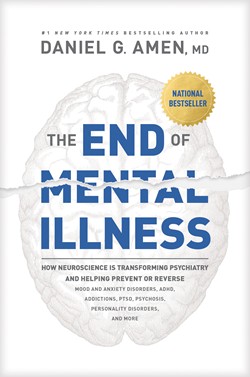While there is a lot of conflicting health information about food, there is also a lot of agreement. If you follow these eleven rules, your brain health/mental health will start to improve within days.
By Dr. Daniel G. Amen, excerpted from The End of Mental Illness
A growing body of evidence now suggests that nutritional treatment may help prevent, treat, or improve depression, bipolar disorder, schizophrenia, anxiety, ADHD, autism, addiction, and eating disorders. In fact, in 2015, a group of eighteen scientists concluded that “that diet is as important to psychiatry as it is to cardiology, endocrinology, and gastroenterology.” While there is a lot of conflicting health information about food, there is also a lot of agreement. If you follow these eleven rules, your brain health/mental health will start to improve within days.
Rule #1. Only love foods that love you back.
Nearly everywhere you go, someone is trying to sell you low-quality, tasty food that will hurt your brain health/mental health and kill you early. Corporations hire food scientists to combine fat, sugar, and salt with the perfect “texture,” “crunchiness,” “meltiness,” and “aroma” to overwhelm the brain with flavor to trigger the “bliss point” in your brain, making you literally fall in love with low-quality foods. Being in love with something that hurts you is an abusive relationship that needs serious intervention. No food of any kind belongs in the same emotional place in your brain as the love you have for your spouse, children, or grandchildren.
Rule #2. Go for the highest quality calories you can find, and not too many of them if you need to lose weight.
If you tend to eat when you’re feeling depressed, stressed, or anxious and you struggle with your weight, know the amount of calories you consume a day; but also know that the quality of the calories matters more. If you only eat 800 calories of Twinkies a day, you may lose weight in the short-term, but it will definitely make you sicker in the long run. Only eat the highest-quality foods you can find, that are also calorie smart.
Rule #3. Hydrate, but don’t drink your calories.
Drink eight to ten glasses of water a day to stay properly hydrated. Your brain is comprised of 80 percent water and being even mildly dehydrated can negatively impact your moods—making you feel more anxious, tense, depressed, or angry—in addition to sapping your energy levels and lowering your ability to concentrate. Replace sugary drinks with plain water, sparkling water, or water flavored with slices of fruit.

Rule #4. Eat high-quality protein at every meal to balance blood sugar and keep cravings away.
After water, protein is the most abundant substance in your body. Protein helps you feel fuller longer and burn more calories than you do after eating high-carb, sugar-filled foods. Small amounts of high-quality protein are crucial to good health. High-quality animal protein is free of hormones and antibiotics, free range, and grass fed. It is more expensive than industrial farm-raised animal meats but your brain health/mental health is worth the investment.
Rule #5. Eat and cook with high-quality fat.
Fat is not the enemy. Sixty percent of the solid weight of your brain is fat. However, not all fats are equal. Avoid trans fats (found in foods like processed crackers, baked goods, and frozen pizza), which are associated with an increase in depression. Also skip fats that are higher in omega-6 fatty acids, such as many refined vegetable oils, which are associated with an increase in inflammation. Focus instead on healthy fats, such as avocados, nuts, seeds, and sustainable, clean fish.
Rule #6. Go for smart carbohydrates (colorful, low-glycemic, high-fiber).
“Smart” carbohydrates are packed with nutrients that balance your blood sugar and reduce cravings. Most vegetables and legumes are low glycemic (unlikely to raise blood sugar). So are many fruits, such as apples, pears, and berries. Fiber is a special type of carbohydrate, which enhances digestion, reduces the risk of colon cancer, and helps to balance blood pressure and blood sugar. fiber foods, such as broccoli, berries, onions, flax seeds, nuts, green beans, cauliflower, celery, and sweet potatoes (the skin of one sweet potato has more fiber than a bowl of oatmeal!) have the added benefit of making you feel full faster and longer.
Colorful vegetables and fruits are full of brain health/mental health benefits, providing nutrients, vitamins, minerals, and antioxidants. They boost the level of antioxidants in your body, which reduces the risk of developing cognitive impairment and depression.

Rule #7. Use herbs and spices like medicine.
Herbs and spices are as powerful as medicines. Unlike pharmaceutical drugs, which often come with an alarming range of side effects, herbs and spices have minimal consequences. They support your health and tantalize your taste buds. In multiple studies, a saffron extract was found to be as effective as antidepressant medication in treating people with major depression. Turmeric, found in curry, contains a chemical that has been shown to decrease the plaques in the brain thought to be responsible for Alzheimer’s disease. Scientific evidence shows rosemary, thyme and sage help boost memory, and garlic and oregano boost blood flow to the brain.
Rule #8. Make sure your food is as clean as possible and read the labels.
Go organic, hormone-free, antibiotic-free, grass-fed, and free-range as much as possible, and eliminate food additives, preservatives, artificial dyes and sweeteners. This means you must start reading food labels. If you do not know what is in a food item or it is not real food, don’t eat it.
Rule #9. If you struggle with any brain/physical health issue, eliminate sugar, MSG, gluten, corn, soy, and dairy for a month to see if you improve.
Over the years elimination diets have been one of the most important weapons against brain health/mental health issues. If you can try an “elimination diet” for just a month, it often makes a dramatic difference. The best way to see if you are sensitive to certain foods is to eliminate all the potential culprits, and add them back one at a time.

Rule #10. Use intermittent fasting to supercharge your brain.
Focus on brain healthy eating throughout the day, but fast for at least twelve hours between dinner and breakfast. Intermittent fasting, or “time-restricted feeding,” has been shown to significantly improve memory, mood, fat loss, weight, blood pressure, and inflammatory markers. Nightly twelve-to-sixteen-hour fasts turn on a process called autophagy, which helps your brain “take out the trash” it accumulates during the day. This can help you think more clearly and feel more energetic. This type of fasting is simple—if you eat dinner at 6 p.m., don’t eat again until 6–10 a.m. the next day. Your brain will have the time it needs to cleanse itself.
Rule #11. Get a routine that serves your health rather than hurts it; find twenty foods you love that love you back.
We are all creatures of habit. Once you allow your brain to do something, it will want to do it again, whether or not it is good for us. The secret to changing your foods is to find twenty you love that love you back. A diet full of nutrition is not boring. On the contrary, it can be loaded with meals that taste amazing. Once you eliminate the adulterated foods loaded with sugar, salt, fat and artificial chemicals, in about 10 days, your taste buds will come back to life and whole foods will taste amazing.
 The End of Mental Illness by Daniel G. Amen, MD
The End of Mental Illness by Daniel G. Amen, MD
PUBLISHER’S WEEKLY and USA TODAY BESTSELLER! New hope for those suffering from conditions like depression, anxiety, bipolar disorder, addictions, PTSD, ADHD and more.
Though incidence of these conditions is skyrocketing, for the past four decades standard treatment hasn’t much changed, and success rates in treating them have barely improved, either. Meanwhile, the stigma of the “mental illness” label—damaging and devastating on its own—can often prevent sufferers from getting the help they need.
Brain specialist and bestselling author Dr. Daniel Amen is on the forefront of a new movement within medicine and related disciplines that aims to change all that. In The End of Mental Illness, Dr. Amen draws on the latest findings of neuroscience to challenge an outdated psychiatric paradigm and help readers take control and improve the health of their own brain, minimizing or reversing conditions that may be preventing them from living a full and emotionally healthy life.




